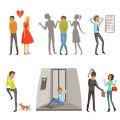Introduction: Understanding Falls in Older Adults
In the United Kingdom, falls among older adults represent a significant concern, touching the lives of individuals, their carers, and families in profound ways. The experience of a fall is often much more than a simple accident; it can lead to emotional distress, physical injury, and a loss of confidence that may affect independence and overall well-being. For many older people, the fear of falling becomes a daily companion, influencing choices and activities, while family members and carers face the delicate balance of encouraging autonomy and ensuring safety. Navigating these challenges requires not only compassion but also practical strategies to minimise risks. As we gently explore the journey of ageing, it becomes clear that understanding and addressing the factors contributing to falls—such as vision and hearing health—is essential for fostering dignity, reassurance, and quality of life for everyone involved.
2. The Link Between Vision, Hearing, and Falls
It is increasingly recognised across the UK that changes in vision and hearing can have a profound impact on an individual’s risk of experiencing a fall. Everyday activities such as walking along uneven pavements, stepping onto buses, or navigating busy supermarkets rely heavily on our ability to see and hear clearly. When these senses are diminished—even slightly—the likelihood of tripping, losing balance, or misjudging distances rises significantly.
A recent study by Age UK highlighted that nearly 50% of people over the age of 75 live with sight loss or hearing impairment, yet many do not realise the extent to which these changes affect their mobility and confidence. In British homes, where cluttered hallways or poor lighting are common, undetected declines in vision can mean hazards go unnoticed until it is too late. Similarly, difficulty hearing can prevent individuals from noticing warning sounds—such as an approaching cyclist or a kettle boiling over—which may lead to distraction or sudden movements that increase fall risk.
The following table summarises some typical scenarios in daily British life where impaired vision and hearing contribute to falls:
| Scenario | Risk Factor | Example |
|---|---|---|
| Navigating public transport | Poor vision or hearing reduces awareness of steps and announcements | Missing the step when boarding a bus due to unclear visual cues or unheard warnings |
| Walking outdoors on uneven surfaces | Reduced depth perception and balance issues | Tripping over kerbs or potholes in town centres like Manchester or Bristol |
| At home in low-light conditions | Visual impairment makes obstacles harder to detect | Bumping into furniture during early morning hours or at night in older UK housing stock |
| Social gatherings and group settings | Difficulty processing multiple sounds at once | Misinterpreting spoken instructions at community events, leading to awkward movements or missed cues |
Given these everyday experiences, it becomes clear that timely vision and hearing assessments are not just medical formalities—they are vital tools for maintaining independence and safety. Regular check-ups enable early detection of changes that might otherwise go unnoticed amid the hustle and bustle of British life. By addressing these sensory challenges proactively, individuals and carers alike can make practical adjustments—from improved lighting at home to using assistive listening devices—helping everyone feel more confident and secure in their daily routines.

3. Importance of Routine Vision Assessments
Having regular eye checks is a vital part of staying safe and independent, particularly as we age. Our eyesight naturally changes over time, and these subtle shifts can make everyday activities more challenging, often without us realising it. Even minor changes in vision can affect balance, depth perception, and the ability to spot hazards at home or outdoors—factors that contribute significantly to the risk of falls.
In the UK, the NHS sight test is a familiar and accessible service for many. Through local opticians, both private and NHS-funded eye tests are widely available. For those over 60, or living with certain health conditions, regular NHS sight tests are free of charge, making it easier to keep on top of vision health. These assessments do more than check for changes in your glasses prescription; they can also identify early signs of common eye conditions like cataracts, glaucoma, or macular degeneration—conditions that might otherwise go unnoticed until they start affecting your daily life.
By attending routine vision assessments, potential problems can be caught early and addressed before they contribute to slips, trips, or falls. Simple interventions such as updating glasses or referring for further treatment can make a world of difference in everyday confidence and mobility. Encouraging loved ones to take up their NHS sight test entitlement is a gentle way to support their independence and wellbeing, helping them stay safe at home and when out and about in the community.
4. Hearing Checks as Part of Fall Prevention
Hearing assessments are a vital yet often overlooked aspect of fall prevention, especially among older adults in the UK. As we age, changes in hearing can subtly undermine our balance and spatial awareness, increasing the risk of falls. Regular hearing checks not only help to identify early signs of hearing loss but also open the door to interventions that support both safety and confidence in daily life.
The Importance of Hearing Assessments
Hearing is closely linked with balance; diminished auditory input can affect how we orient ourselves and navigate our environment. Even mild hearing loss can make it harder to detect hazards, such as approaching traffic or someone calling out a warning. By including routine hearing checks as part of a comprehensive fall prevention plan, individuals and their families can address issues before they contribute to accidents.
Accessing Community Audiology Services
The NHS provides community audiology services across the UK, making it straightforward for people to book a hearing assessment without lengthy waits. Many local clinics offer walk-in sessions or appointments by referral from your GP. These services range from simple screening tests to more detailed assessments, ensuring that support is tailored to individual needs. The table below outlines some common audiology services available in local communities:
| Service | Description | How to Access |
|---|---|---|
| Basic Hearing Test | Initial screening for hearing loss | Walk-in clinics or GP referral |
| Comprehensive Audiology Assessment | In-depth evaluation including speech and balance tests | GP referral required |
| Hearing Aid Fitting & Support | Provision and maintenance of NHS hearing aids | Audiology clinic after assessment |
| Tinnitus Support | Counselling and sound therapy for tinnitus management | Audiology clinic or community support group |
The Benefits of Early Intervention
Early detection of hearing changes allows for timely intervention, which may include hearing aids, environmental modifications, or communication strategies. These steps not only restore a sense of connection but also help maintain independence and reduce anxiety about falling. For many, improved hearing means feeling safer when moving around at home or outdoors, leading to greater participation in community life and less fear of isolation.
Including regular hearing assessments in your overall health plan is a gentle but powerful way to invest in well-being and dignity. By working together with healthcare professionals, you can ensure that small changes today prevent bigger challenges tomorrow—helping you or your loved ones stay steady, safe, and confident.
5. Integrating Assessments Into Everyday Care
Ensuring regular vision and hearing assessments are woven into the fabric of daily care can make a meaningful difference in preventing falls, particularly within British care settings such as care homes and GP surgeries. By making these checks a natural part of everyday routines, we can create safer environments and support individuals in maintaining their independence.
Making Vision and Hearing Checks Routine
For individuals and carers, its helpful to approach vision and hearing assessments as you would any other aspect of personal wellbeing—like taking medication or enjoying a cup of tea. Setting reminders for regular eye tests with local opticians, which are often free on the NHS for those over 60 or with certain conditions, ensures changes in sight are detected early. Likewise, annual hearing checks at your GP surgery or through community services can be easily arranged and included in health reviews.
Practical Steps for Carers
Carers play a vital role in promoting regular assessments. Encourage those you support to attend scheduled appointments, and keep a record of when checks are due. During daily routines, gently ask about any new difficulties with seeing or hearing. Small cues, such as turning up the television volume or hesitancy navigating familiar spaces, may indicate it’s time for another assessment.
Long-Term Care Providers’ Role
In care homes, managers can build vision and hearing checks into residents’ care plans. Partnering with local optometrists and audiologists to offer on-site clinics provides convenience and reassurance for residents who may find travel challenging. Training staff to spot early signs of sensory decline—such as squinting or asking for things to be repeated—can prompt timely referrals.
Creating Supportive Environments
A gentle approach makes these assessments feel less clinical and more like an act of kindness. Display reminders on noticeboards, discuss upcoming appointments during resident meetings, and celebrate good eye and ear health. By seamlessly embedding these practices into the rhythms of daily life, we honour each individual’s dignity while significantly reducing the risk of falls.
6. Empowering Older Adults and Carers
Supporting older adults and their carers in the UK to take an active role in their own wellbeing is a vital aspect of fall prevention, especially when it comes to vision and hearing assessments. Gentle encouragement goes a long way in fostering confidence, self-advocacy, and independence.
Gentle Encouragement for Self-Advocacy
It can sometimes feel daunting to speak up about changes in your sight or hearing, but you are never alone. Regularly discussing these concerns with your GP, optician, or audiologist is a positive step towards maintaining your health and independence. Don’t hesitate to ask questions or request referrals if you notice any changes—your voice matters in your care journey.
Useful UK Resources
There are many excellent organisations across the UK offering practical support and guidance:
- RNIB (Royal National Institute of Blind People): Provides information on eye health, local services, and practical tips for daily living (rnib.org.uk).
- Action on Hearing Loss (RNID): Offers resources on hearing tests, aids, and communication support (rnid.org.uk).
- Age UK: Delivers advice lines, befriending services, and local support for older adults and carers (ageuk.org.uk).
- NHS Choices: Comprehensive advice on accessing NHS vision and hearing services (nhs.uk).
Together in Collaborative Care
If you are a carer, remember that open conversations help build trust and understanding. Attending appointments together, taking notes, and encouraging regular assessments can make a meaningful difference. By working as a team—older adults, carers, and healthcare professionals—we can reduce the risk of falls and help everyone remain safely independent at home.
Your journey is unique; every small step towards proactive care brings greater peace of mind. Embrace available resources and reach out for support whenever you need it.
7. Conclusion: Creating a Safer Future Together
As we draw this discussion to a close, it is important to recognise the profound impact that proactive vision and hearing assessments can have on fall prevention across our communities. By addressing these often-overlooked aspects of wellbeing, we empower individuals—especially older adults—to maintain their independence, dignity, and quality of life. Early identification and management of sensory changes provide not only practical benefits in reducing the risk of falls but also nurture a culture of care, empathy, and collective responsibility. Let us embrace a future where routine vision and hearing assessments are standard practice, fostering safer environments for everyone. Together, through awareness and supportive action, we can inspire hope and confidence, ensuring that every member of our community feels seen, heard, and valued as they navigate each day with greater assurance.

